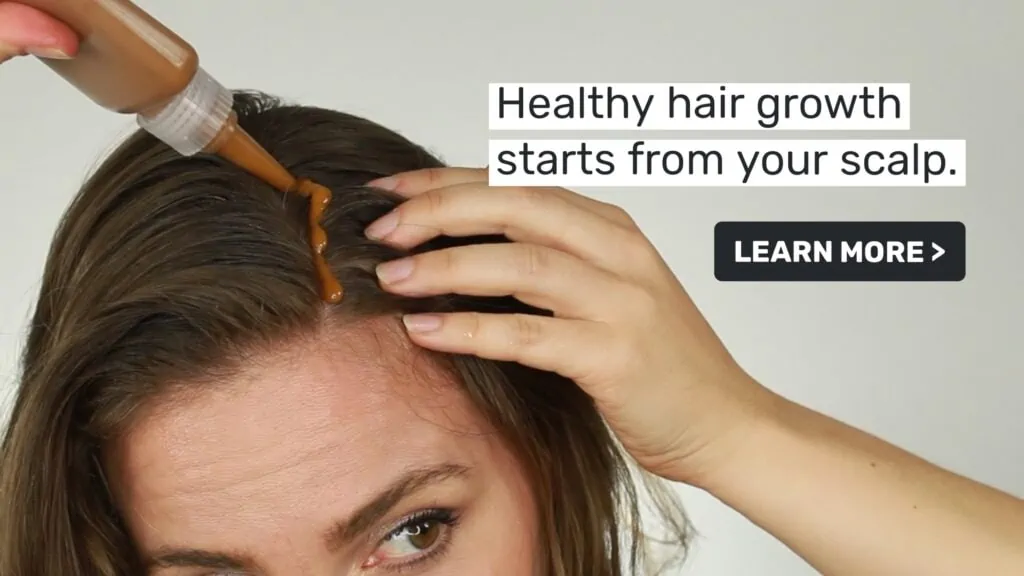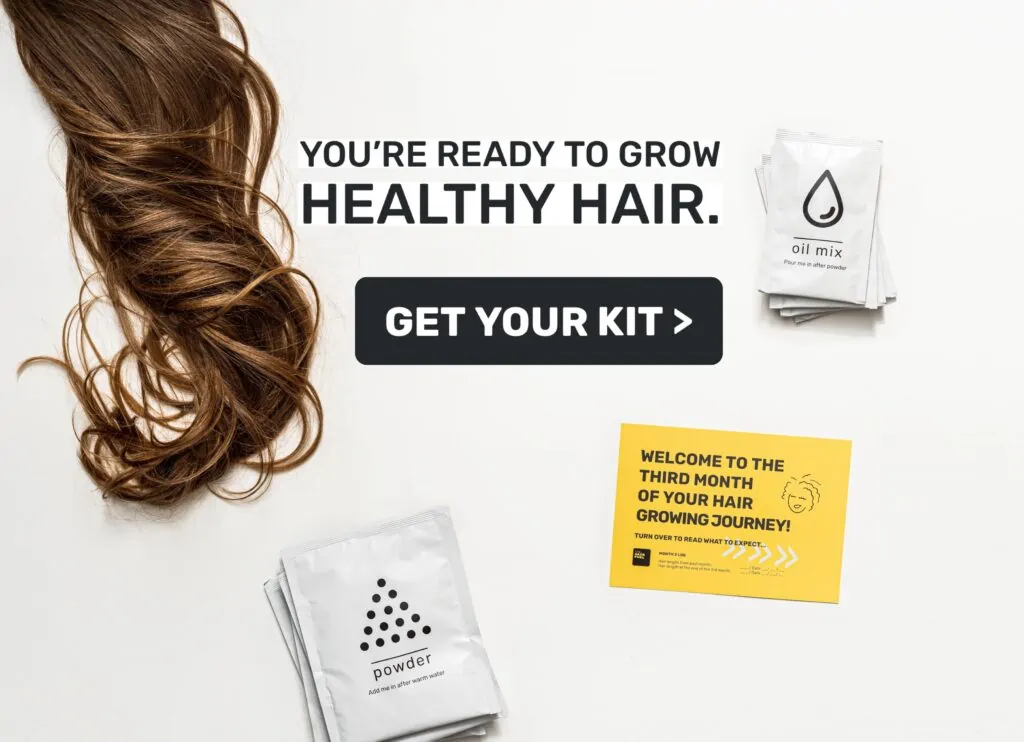When you think about hair loss, you tend to focus on the immediate topical solutions and hair vitamins to help you alleviate the problem. But looking at your biology closer and deeper, it becomes obvious that these are not quite the key players of hair health. What food you consume becomes ever so important in hair health when you understand the role your gut plays in it. The delicate relationships within your gut microflora signal to other parts of your body – including keratinocytes – cells in your hair follicles – to either attack and destroy a hair follicle or grow healthy hair from it. In this article we take a closer look in the role our gut health plays when it comes to hair loss, hair growth and hair health in general.
Intro to gut biology
Your gastrointestinal (GI) tract is one of the largest surfaces (250–400 m2) between you – the “host” – and environmental factors. In an average lifetime, around 60 tonnes of food pass through your GI tract, along with many harmful microorganisms that can threat gut integrity. The collection of bacteria, cells, archaea and eukarya colonising the GI tract is termed the ‘gut microbiota’ and has co-evolved with your body over thousands of years to form an intricate and mutually beneficial relationship.
The number of microorganisms inhabiting the GI tract has been estimated to be around 38 trillions (38,000,000,000,000) – and is roughly 1:1 of the amount of the “human” cells. And even though microorganisms only account for less than 1% of your weight, their impact far outweighs its physical weight.
Good vs bad gut bacteria
Out of the thousands of species of gut microbes that live in our gut, we have the beneficial bacteria which help us with digestion, control our immune system and brain health and we have the pathogenic or disease-causing bacteria which are not beneficial.
How does poor gut health lead to hair loss?
Threats to a healthy gut microbiome include stress, frequent antibiotic use, poor diet, and other behaviours.
- Stress can affect health through its impact on gut bacteria, your autonomic nervous system and circulatory systems carry distress signals to the gut. The heightened inflammation that frequently accompanies stress and depression triggers blooms of pathogenic bacteria that encourage dysbiosis (reduction of bacterial diversity) and a leaky gut.
- Frequent antibiotic use literally kills the bacteria necessary in your gut. Prescription antibiotics can cause temporary hair thinning. They can deplete your vitamin B and production of hemoglobin, which disrupts hair growth. When hemoglobin is too low, you can become anaemic and lose hair as a result. In addition, the dysbiosis that results from frequent antibiotic use will reduce amount of bacteria that can manufacture nutrients necessary for your hair follicles to grow hair.
- Poor diet consitutes consumption of simple and refined sugars, highly processed foods low in fibre, artificial sweeteners, red meat, and alcohol. These are also foods linked to foods causing hair loss, feeding the harmful bacteria that crowd out the good bacteria. As a result good bacteria doesn’t have enough fuel to produce nutrients necessary for healthy hair growth.
A disturbed environment in your gut sends signals to the rest of your body and these stress signals are directly linked to hair loss – otherwise known as inflammation and autoimmune conditions.
Inflammation and hair loss
Inflammation in your body and your scalp leads to your body trying to “put out” those fires by sending dihydrotestosterone (DHT) molecules to the scalp to help fight it. And while DHT, present in both, men and women, is doing a great job at putting out the inflammation, it also causes to hair follicle calcification, scarring of the dermal sheath which envelopes the hair follicle and as a result leads to hair follicle miniaturisation. As hair follicle reduces in size, it asks for less blood and nutrients – which further worsens the problem, since as it gets less nutrients, it reduces in size further.
Autoimmune conditions and hair loss
Autoimmune conditions is where your body immune system attacks its own cells, sometimes those cells being the very hair follicles responsible for hair growth (e.g. alopecia universalist). Autoimmune conditions that frequently lead to hair loss are:
- Alopecia areata
- Lupus
- Hashimoto’s disease
- Psoriasis
- Crohn’s disease and IBS

Nutrient depletion in gut and hair loss
As your body immune system is compromised due to poor gut health, it will start looking for nutrients in other parts of your body, or directing all the nutrients that you consume into the parts of your body where it needs help the most. For example – if you are deficient in magnesium, your body will “steal” it from your hair follicles – just so that it can support a healthy nervous system. Magnesium is absorbed in your GI tract: namely your small and large intestine.
Hair-related hormones in gut
The gut microbiome also produces hormones and signals to the glands in your body to let them know how much of each hormone should be created and released. The gut microbiota regulate or impact nearly every hormone in the body, including estrogen, thyroid hormones and melatonin. In that way regulating the transition between the three phases of hair growth from anagen through catagen and to telogen.
Gut bacteria also manufactures some neurotransmitters and neuromodulators – necessary for functioning of a healthy nervous system, giving rise to the notion that “gut is the second brain”. A healthy nervous system is crucial to maintain overall level of health and reducing the risk of telogen effluvium, or stress-related hair loss.
B-vitamin role in gut health
Our gut is also responsible for synthetising vitamin B – crucial in regulating our immunity and necessary in manufacturing of T cells – cells responsible for building up our immunity. Going far beyond vitamin B6 commonly known as “biotin” the popular vitamin for hair growth, here are some examples how B-vitamin depletion can lead to hair health problems:
- Insufficient vitamin B1 can lead to lethargy and energy depletion in which instance your body will not bother itself to support hair growth function;
- lack of B3 can lead to intestinal inflammation (which is linked to scalp inflammation and miniaturisation of hair follicles), diarrhoea (which leads to poor absorption of nutrients that you consume crucial to “fuel” your hair growth), and dermatitis (a skin disease that can lead to hair loss if it occurs around the hairline or the entire scalp, amongst others).
Feed your gut bacteria for hair growth
The good bacteria boast microbial enzymes, which, on the other hand, break down food and produce micronutrients and vitamins that our body can use. A diet rich in fermented foods, such as kimchi, sauerkraut, yoghurt, kombucha, fermented soy beans helps in maintaining a healthy gut microflora which in turn – supporting the good bacteria in manufacturing hormones, nutrients and vitamins crucial for hair growth.

The good bacteria also loves feeding on highly fibrous vegetables low in sugar and naturally rich in vitamins. Actually by breaking down the fibre from these foods, a very popular “hair vitamin“, vitamin B6 – or biotin is naturally produced in your gut. Studies in mice have shown that deficiency in biotin leads to alopecia, but reinstating a diet that has normal levels of biotin reversed the side effects of initial biotin deficiency. Biotin manufactured from the foods you consume, is necessary for the growth and survival of the gut microbiota, so that it can synthesise necessary nutrients for hair growth.
What to eat for good gut health and hair growth?
To help you tackle hair loss stemming from poor gut microflora you should consume sufficient amounts of fermented foods, supplement your diet with vitamins and omega-3s, as well as food items rich in essential vitamins and micronutrients such as legumes, nuts, green leafy vegetables, sustainably sourced fish, eggs and some lean meats feed the good gut bacteria and as a result, are good for hair growth.
Note that supplementation alone isn’t sufficient, since your gut also needs ferments from the foods like kefir, kimchi and sauerkraut and fibre that comes with consuming fresh vegetables and fruits. And, if there ever was an argument towards consuming particularly cruciferous vegetables, your gut health is one of them.
Cruciferous vegetables are rich in indole-3-carbinol (I3C) which, once broken down by the stomach acid is manufactured into AhR (Aryl Hydrocarbon Receptor) ligands. These AhR receptors are often blamed for absorption of harmful toxin – dioxin – an environmental pollutant. But AhR ligands manufactured by your body from consumption of cruciferous vegetables prevent dioxin landing into your body thus reducing its harmful effects.
Another compound, butyrate acid, manufactured by the bacteria in your gut when it breaks down and ferments dietary fiber – activates AhR pathways in the gut.
Overall, AhR activation has an overall anti-inflammatory effect and regulates your immune system, in a normal or “healthy” state as well as inflammatory scenarios such as autoimmunity or infection. The latter is especially important to note since as we explained before, there is a variety of autoimmune diseases whose side effects include hair loss.
Cruciferous vegetables that are rich in I3C as well as high in dietary fiber include broccoli, cabbage, kale, cauliflower and Brussel sprouts.
Conclusion
Gut microflora plays a key role in supporting healthy immune system, which prevents it from “stealing” nutrients from your hair follicles as well as being able to manufacture and synthesise vitamins and micronutrients crucial for hair growth. To maintain healthy gut microflora for hair health you need to feed the good bacteria with fermented foods, highly nutritious and fibrous vegetables, eggs and healthy fats to improve the absorption of some of the fat-soluble vitamins. As you are taking the steps in regulating your gut back to health, it will take time. Meanwhile, you should focus on supporting your scalp health and hair follicles to help it grow healthy hair and tackle hair loss.
Sources:
You AhR What You Eat: Linking Diet and Immunity, Cell, 2011, (1)
Stress, depression, diet, and the gut microbiota: human–bacteria interactions at the core of psychoneuroimmunology and nutrition, (2)
Modulation of Immune Responses by Nutritional Ligands of Aryl Hydrocarbon Receptor, (3)
Revised Estimates for the Number of Human and Bacteria Cells in the Body, (4)
